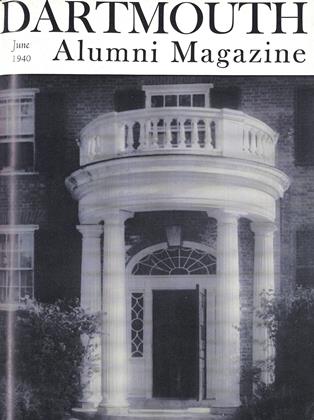By ProfessorFrangois Denoeu. Les Presses Modernes,Paris, France, p. 352. Ij.75.
PECHES DE JEUNESSE, by Professor Francois Denoeu. Librairie Mona, Paris, p. pi.$1.50. Note: The Dartmouth Bookstore, Hanover, N. H., is the exclusive American distributor of both these books.
BEAU-POIL" IS THE NAME by which his comrades call the young French soldier who is the hero of the former book. He has seen seivice in the World War of 1915-18, although only twenty years old; and now has been sent to Morocco for a year of service in the French army there. The novel is a record of his adventures.
The adventures most disturbing to the hero are amorous ones. He meets a French widow, considerably older than himself, but still young, who is supporting herself and her daughter by singing in cafes and night-clubs. The widow falls in love with "Beau-Poil." But so does her daughter, with the ardor of first love in a girl in her middle 'teens. The hero cannot for a time decide which he prefers; or whether he prefers neither, but will seek con- solation of a more physical sort, liberally pro- vided under the tolerant surveillance of the array authorities. Incidentally, the hero's first essay in this direction ends amusingly, in a fashion which suggests not so much the moral "Avoid the red-light district" as the moral "Don't drink what the red-light district proffers as champagne!"
The military adventures of the hero are concerned chiefly with skirmishes in the mountains against Berber tribes who molest commerce. The wild, volcanic scenery of the mountains, and the days of sentinel-duty endured between skies flaming and an earth glowing with heat, are vividly rendered; and the reader is made familiar with the alarms of guerilla warfare. Beau-Poil himself runs into no physical disaster; his chief peril arises from a courtmartial which a negligence has brought down upon him.
Most interesting of all to an American reader will probably be the setting of the story. Morocco—land of radiant flowers and odors of the orange and jasmine, of cameldung and fleas; country of fierce, darkskinned warriors, of dark eyes coquetting in faces hidden for the rest in white veils, mendicants horrible beyond imagining! Who can resist the enchantment of Morocco's cities of fabulous minarets and gateways and mosaics, their houses tunnelled by secretive alleys, plunging and turning in depths of gloom between the white walls? Or of Morocco's enchanted groves where one may hear a nightingale singing beneath the moon? A land of stinks and savors and surprises, where mingle the intensest passions and the deepest languors. The cruelty and the color of Morocco fill these pages. In passing, it may be noted that certain, details in the story are not exactly "pour les jeunes filles"; but then, neither is Morocco.
Professor Denoeu entitles his poems deprecating "Sins of Youthfulness." But they are not sins, surely; even the less distinctive of them are graceful peccadilloes, and some of them are considerably more than that. Some of these poems record their author's impressions of the landscape of France, or of New England; a few were written in Morocco; and a considerable number were evoked by the World War. One of these seems particularly impressive: "Les Hommes, Ca Passe Si Vite!"— "Men Pass Away So Swiftly!" Here, in dramatic form, are intermingled the voices of an old and a young soldier, of a man snoring, and of the guns and inanimate participants of war, against a background of night, shadow, and mystery. For the rest, these poems express a philosophy balanced and equable; an acceptance of the bad with the good, a refusal to seek consolation in mirages, and an endeavor to find within experience itself the compensations and rewards of experience.
Professor C. E. Dankert, is the author of Machinery and Economic Insecurity, which appears in the April issue of the AmericanFederationist.
Experimental Studies of the Relation Between Rate of Reading and Speed of Association, by Professors R. M. Bear and H. S. Odhert has been published as a separate and in the Journal of Psychology, 1940.
 View Full Issue
View Full Issue
More From This Issue
-
 Article
ArticleGordon Ferrie Hull
June 1940 By STEARNS MORSE PROFESSOR OF ENGLISH -
 Article
ArticleIn Reply to Mr. Qua
June 1940 By Judicial Temperament, JOHN G. GAZLEY -
 Sports
SportsBig Green Teams
June 1940 By Whitey Fuller '37 -
 Class Notes
Class Notes1915*
June 1940 By CHARLES R. TAPLIN, RUSSELL B. LIVERMORE -
 Class Notes
Class Notes1931*
June 1940 By CHARLES S. McALLISTER, CRAIG THORN JR. -
 Class Notes
Class Notes1930*
June 1940 By ALBERT I. DICKERSON, G. WARREN FRENCH
F. Cudworth Flint
-
 Books
BooksTHE LANGUAGE OF POETRY,
May 1942 By F. Cudworth Flint -
 Books
BooksBROTHERHOOD OF MEN
July 1949 By F. Cudworth Flint -
 Books
BooksSELECTED POEMS
October 1951 By F. Cudworth Flint -
 Feature
FeatureKenneth Allan Robinson
February 1962 By F. CUDWORTH FLINT -
 Books
BooksTHE MODERN CRITICAL SPECTRUM.
DECEMBER 1962 By F. CUDWORTH FLINT -
 Books
BooksTHE GEORGIAN REVOLT: RISE AND FALL OF A POETIC IDEAL, 1910-1922.
NOVEMBER 1965 By F. CUDWORTH FLINT
Books
-
 Books
BooksTen Introductions a Collection
January 1935 -
 Books
BooksAlumni Articles
NOVEMBER 1969 -
 Books
BooksThe Crookshaven Murder
MARCH, 1928 By F. L. C. -
 Books
BooksLOVE MATCH AND ARRANGED MARRIAGE, A TOKYO-DETROIT COMPARISON.
NOVEMBER 1967 By FRANCIS E. MERRILL '26 -
 Books
BooksBriefly Noted
APRIL 1969 By J.H. -
 Books
BooksTHE MOST AMAZING BUT TRUE.
JUNE 1966 By JOHN HURD '21

